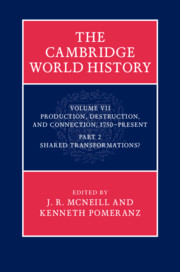Book contents
- The Cambridge World HistoryVolume VII
- The Cambridge World History
- The Cambridge World HistoryProduction, Destruction, and Connection, 1750–Present
- Copyright page
- Contents
- Figures
- Maps
- Tables
- Contributors
- Preface
- Part I Social developments
- Part II Culture and Connections
- Part III Moments
- 12 Atlantic revolutions: a reinterpretation
- 13 Global war 1914–45
- 14 The Cold War
- 15 1956
- 16 1989 as a year of great significance
- Part IV Ligaments of Globalization
- Index
- References
12 - Atlantic revolutions: a reinterpretation
from Part III - Moments
Published online by Cambridge University Press: 05 May 2015
- The Cambridge World HistoryVolume VII
- The Cambridge World History
- The Cambridge World HistoryProduction, Destruction, and Connection, 1750–Present
- Copyright page
- Contents
- Figures
- Maps
- Tables
- Contributors
- Preface
- Part I Social developments
- Part II Culture and Connections
- Part III Moments
- 12 Atlantic revolutions: a reinterpretation
- 13 Global war 1914–45
- 14 The Cold War
- 15 1956
- 16 1989 as a year of great significance
- Part IV Ligaments of Globalization
- Index
- References
Summary
Keywords
- Type
- Chapter
- Information
- The Cambridge World History , pp. 273 - 298Publisher: Cambridge University PressPrint publication year: 2015

